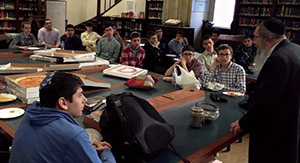
Back in November, MTA’s own Rabbi Danto kicked off the special Bein Ha’sedarim Raffle Program, open to students in all grades. The idea was to encourage talmidim to learn in a Beis Medrash environment during the off-time each week (between Thursday night and Sunday morning) for at least one hour and fifteen minutes. For each learning session, students earned a raffle ticket for a $180 prize, and those who learned enough had access to the grand raffle, which carried with it the prize of $1,000.
Nearly 50 students participated, and those who submitted a record of learning time—even once –were invited to a wrap-up lunch on Wednesday, April 15th. There, the winning tickets were finally drawn. After a pizza lunch, Rabbi Taubes gave a brief introduction to the special guest speaker, Ha’rav Aharon Kahn, shlit”a, a Rosh Yeshiva at YU whose many talmidim over the years include Rabbi Taubes himself. The boys were honored to have Rav Kahn address them on a timely topic—the nature of sefiras haomer. Rav Kahn discussed how the Sefer Ha’chinuch treats the mitzvah of sefiras haomer, and explained how the sefirah is both a countdown and a ‘count up’. Although at this time of the year the focus is on Shavuos and Matan Torah, Rav Kahn explained, one must understand that each one of these days is also a day of growth, with inherent value in and of itself. This is one reason for counting up (one day, two days, three days…) and not down. When one counts down, the concentration is only on the end result; when one counts up, every step of the way is crucial. (Rav Kahn’s shiur is available on YU Torah).
At the conclusion of Rav Kahn’s talk, the raffles were drawn. Dani Gruen, of West Hempstead, won the $180 raffle, and Yisrael Friedenberg, of Passaic, won the grand prize—one thousand dollars! The other students wish mazel tov to both winners, and at the same time they recognize that the money was just an incentive, and not the central aim of the program. The focus was to appreciate that even when they are out of the four walls of MTA, it is still their responsibility to keep up their status as bnei Torah.
By David Tanner













